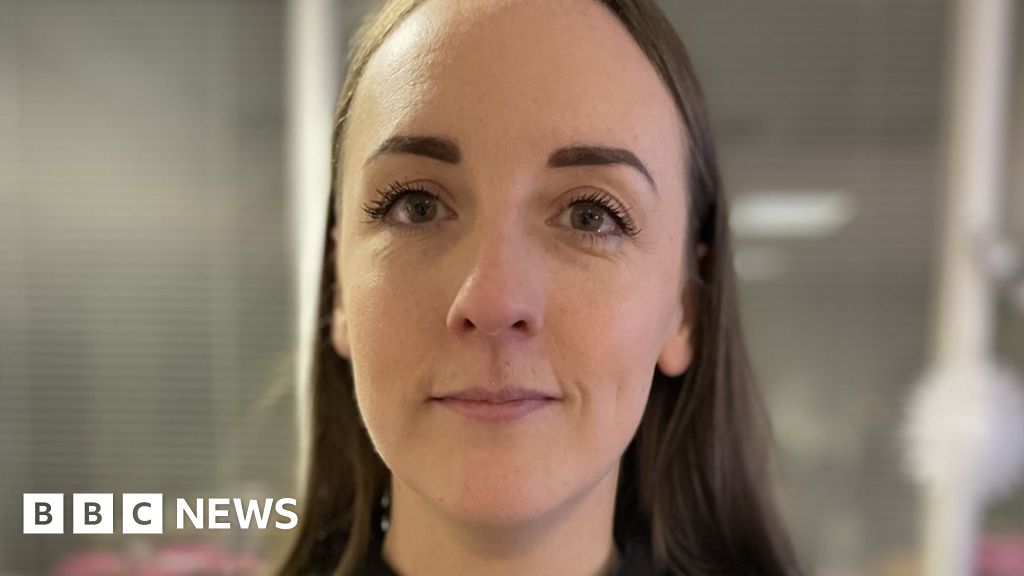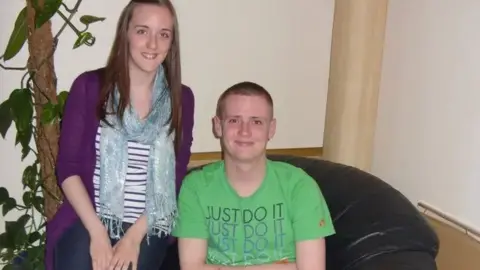 BBC
BBCJen Douglass was 22 when her younger brother Paul was stabbed to death at a house party.
“It’s the most horrific thing a person can go through,” Jen says.
“My whole life changed,” she told BBC Scotland.
At the time of her brother’s death in 2011, Jen was studying dance and drama but she decided she needed to try to prevent other families suffering like hers did.
A decade later Jen has just started work as the first youth “navigator” for the Scottish Violence Reduction Unit (SVRU) in Glasgow.
She helps young people who are at risk of committing crime “navigate” into a better life such as volunteering, college or work.
Jen thinks her brother Paul, who was 20, might have lived if young men were guided away from violent and dangerous behaviour.
“My brother wasn’t the perfect child,” she says. “He misbehaved, he would drink, but he was a young boy.”
She says he and his friend were at the party because there was nothing else for them to do.
“If those boys had something better to do, or had a better understanding of how to react when there was an argument then he would still be alive today,” she says.
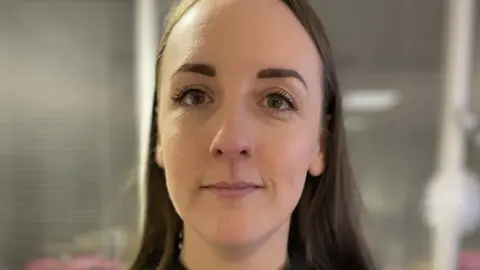
The violence reduction unit was set up almost 20 years ago as a response to Scotland’s rising murder rates, often due to young male gang members carrying knives.
It persuaded the police and other officials to look at violence as a disease and take a public health approach.
Homicide in Scotland is now at the lowest rate in Scotland since comparable records began in 1976 but there is still a lot of work to be done.
The pandemic and the cost of living crisis are hitting society hard.
Jen’s job was set up to help what young people themselves call the “Covid weans” – youngsters who started the pandemic as children and emerged as teenagers.
Jen helps them “navigate” life by being a listening ear and helping them find interesting things to do.
It’s that simple, she says.
There’s a common thread that runs through all the teenagers she meets and three factors are ever present, Jen says.
“Poverty – feeling anxious or depressed – no hope.
“They don’t think there’s anything better for them at age 14 or 15. This is it.
“They don’t realise the opportunity that lies out there for them. They might get a job, they might not – or they will end up in jail.”
Best job
Jen says that while the issues are hard, the job isn’t. She speaks with zest and gusto about the role.
“It’s the best job working with young people,” she says. “There’s such innocence, there’s no filter, what you see is what you get and I love that.”
“It’s about listening to them, not telling them what they should do. They already have adults surrounding them telling them what to do and sometimes they just want to be heard.”
When we met Jen, she was at G20 Works Maryhill in Glasgow.
It provides jobs, training, and support to young people over 16 who might have experienced, or are at risk of, addiction, unemployment and prison.
This is where they come to improve their life chances.
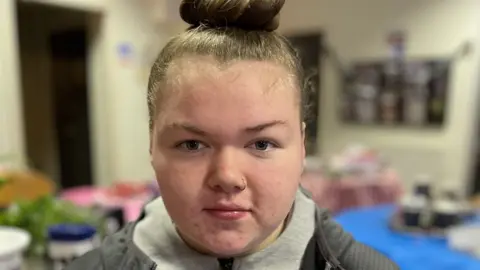
Dionne has been coming here for years and is valued by the staff. Always wanting to be active, sitting about at home or hanging out in a gang is not for her.
She says: “It gave us somewhere to go and kept us off the streets for ages.
“We were all just kicking about having nowhere to go. We thought we were not going to have a good future but ever since this has opened we’ve had work experience, we’ve had stuff to do, we know we’re going to have a positive future now.”
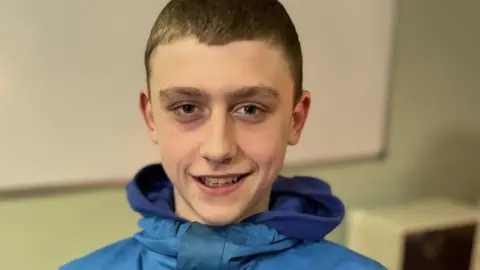
Kyle agrees that it is better than hanging out, not doing much.
“We do washing cars, going out on the food van, cleaning people’s motors,” he says.
“It’s somewhere to go isn’t it, it’s warm, you can play pool, whatever”.
Will Linden, deputy director of the Violence Reduction Unit, says the whole premise is that prevention is better than cure.
Will points to evidence that for every pound spent on preventing violence it is paid back several times.
“That’s still very difficult because you have to invest that money right now,” he says.
Will says he knows money is also needed in other areas such as the NHS and politicians have difficult decisions to make.
But he says: “In reality if we don’t invest we will be storing up problems for the future and at some point that is going to have to be paid for.”
Back at G20, Jen is chatting to Dionne and Kyle while they play pool. A casual chat could turn someone’s life around.
Jen says Paul’s death was more than 10 years ago but he is a constant inspiration.
“I have a picture in my living room, and I look at him, I know he’s still with me,” she says.
“I wouldn’t have the passion and the determination and the empathy if it wasn’t for that.”


